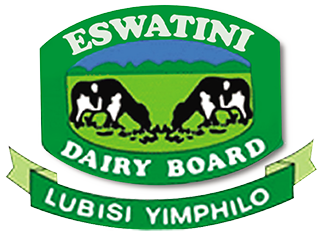Permits & Licenses
(1) The Board may, in accordance with the requirements of the Act, import and export regulations and other laws in the country, issue permits for milk and milk products for import, transit or export.
(2) The permit is for the purpose of controlling and facilitating the importation or exportation of milk and milk products into a country.
(3) Electronic permits may also be issued including electronic signatures.
-
Import and Export permits
(1) Before milk and milk products for import or export as food are exported or imported, an import or export permit must have been issued or given for their import or export.
(2) At the time of the import or export of the milk and milk products, the import and export permit must have effect.
(3) All imported milk products placed for sale in Eswatini must comply with the labelling requirements set out by the Board. -
Application for a dairy permit
(1) The importer, exporter, transitor, distributor, trader may apply for a permit to the Board by furnishing the following information where applicable:
(a) the applicant’s name and address;
(b) Eswatini trading licence;
(c) name and address if different from the applicant;
(d) the name and address of the supplier of the goods;
(e) the country of origin of the goods;
(f) the country from which the goods are imported or exported;
(g) the customs office where the goods will enter or depart Eswatini;
(h) the date of entry or exit of the goods in Eswatini;
(i) a description of the goods;
(j) the number of units of the goods to be imported or exported and their value in Eswatini currency;
(k) any information requested by the Board in any case where, in its opinion, the information furnished by the applicant requires clarification or the description of the goods to be imported is not in sufficient detail.
(l) Value Added Tax (VAT) or Tax identity number (TIN);
(m) export number and certificate for the manufacturer or its equivalence for imports and transit;
(n) Export number and certificate for the distributor or its equivalence for imports and transit;
(o) Export number and certificate for exports;
(p) Market availability (evidence such as the commitment letter for the market); and
(q) a product recall plan. -
Issue of Permits
(1) Where a permit is issued, the Board shall:-
(a) affix the signature of the authorized official to the permit,
(b) permits shall be valid for thirty (30) calendar days or as stated in the permit,
(c) payment of permit fee, and
(d) update information every twelve months and when necessary
(2) Every person to whom a permit has been issued shall, prior to importing or exporting the goods described in the permit certify that;
(a) the information furnished in the application in respect of the permit is correct, and
(b) their status as a registered business. -
Approved permit holder
(1) If a permit is issued for an approved establishment, the permit holder or owner shall be the approved establishment that applied; and
(2) If a permit is issued for a processor, the permit holder or owner shall be the processor that applied; and
(3) If a permit is issued for a trader, the permit holder or owner shall be the trader that applied; and
(4) If a permit is issued to a distributor, the permit holder or owner shall be the distributor that applied; and
(5) If a permit is issued to a transporter, the permit holder or owner shall be the transporter that applied; and
(6) In any other case, the permit holder or owner shall be the applicant registered and approved by the board as the permit holder. -
Permit renewal
(1) A permit shall be valid for thirty (30) calendar days or as stated in the permit,
(2) A permit renewal should commence seven (7) days before its expiry date,
(3) A permit renewal shall require payment of a levy based or the invoice value or specific duty depending on the current board’s notice.
(4) Payments of any other fees associated with the permit shall be in the Schedule of fees notice. -
Lost Permits
(1) Where a permit has been lost or destroyed, the person to whom it was issued may request from the Board a permit to replace it and shall, when making the request, submit a statutory declaration or an affidavit containing:
(a) A statement that the permit has been lost or destroyed and an explanation of the loss or destruction;
(b) In the case of a permit that has been lost, an undertaking to return the original permit to the Board without delay, if it is found.
(c) Pay a penalty for the lost permit if not found 30 days after being issued as stated in the offences and penalties section. -
General permit control
(1) The Board reserves the right:
(a) not to issue a permit;
(b) to revoke a permit before the expiry date;
(c) to amend the permit where and when the need arises;
(2) A permit may be issued electronically.
(3) A person, including a farmer, processor, distributor, importer, exporter, trader, manufacturer, wholesaler, and retailer must have the relevant operating licence for operating a dairy business which may include a trading licence, Board licence, etc.
(4) Payment of fees shall be communicated by the Board through notices or schedule of fees.
(5) Details and amendments on the conditions of the permit shall be in the guidelines on permit control. -
Application for a government permit
(1) The Ministry or the department responsible may, in accordance with the requirements of Animal Diseases Act of 1965, import and export regulations and other laws in the country, issue permits for milk and milk products for import, transit or export.
(2) A person who intends to apply for the issue of a government permit in respect of milk and a milk product shall lodge a written application to the responsible Government Ministry or department.
(3) The application must:
(a) describe the milk and milk products to be exported or imported; and
(b) Identify the exporter or importer of the milk and milk products; and
(c) Identify each establishment including the establishments’ import or export number at which they are to be prepared; and
(d) Be signed by the exporter or importer and the occupier of each such establishment; and
(e) Identify the country to which they are to be exported or imported.
(4) If an application is given the ministry must give each of the persons concern a written notice or permit in relation to, the milk and milk products. -
Requirement for a licence
(1) No person shall, directly or indirectly, engage in or carry on the business of producing, transporting, processing, distributing or marketing dairy and dairy related products unless the person is the holder of a valid licence issued by the Board.
(2) A licence issued pursuant to sub-regulation (1) above may be subject to such terms and conditions as the Board considers appropriate.
(3) Where the Board is not satisfied that an applicant for a licence is qualified by experience, financial responsibility and equipment to properly conduct the proposed business and that the issuance of the licence is in the public interest, the Board may refuse to grant the licence to the applicant.
Various Permits
| Name of Permit | Permit front | Permit Back |
|---|---|---|
| Transit Dairy Products |

|
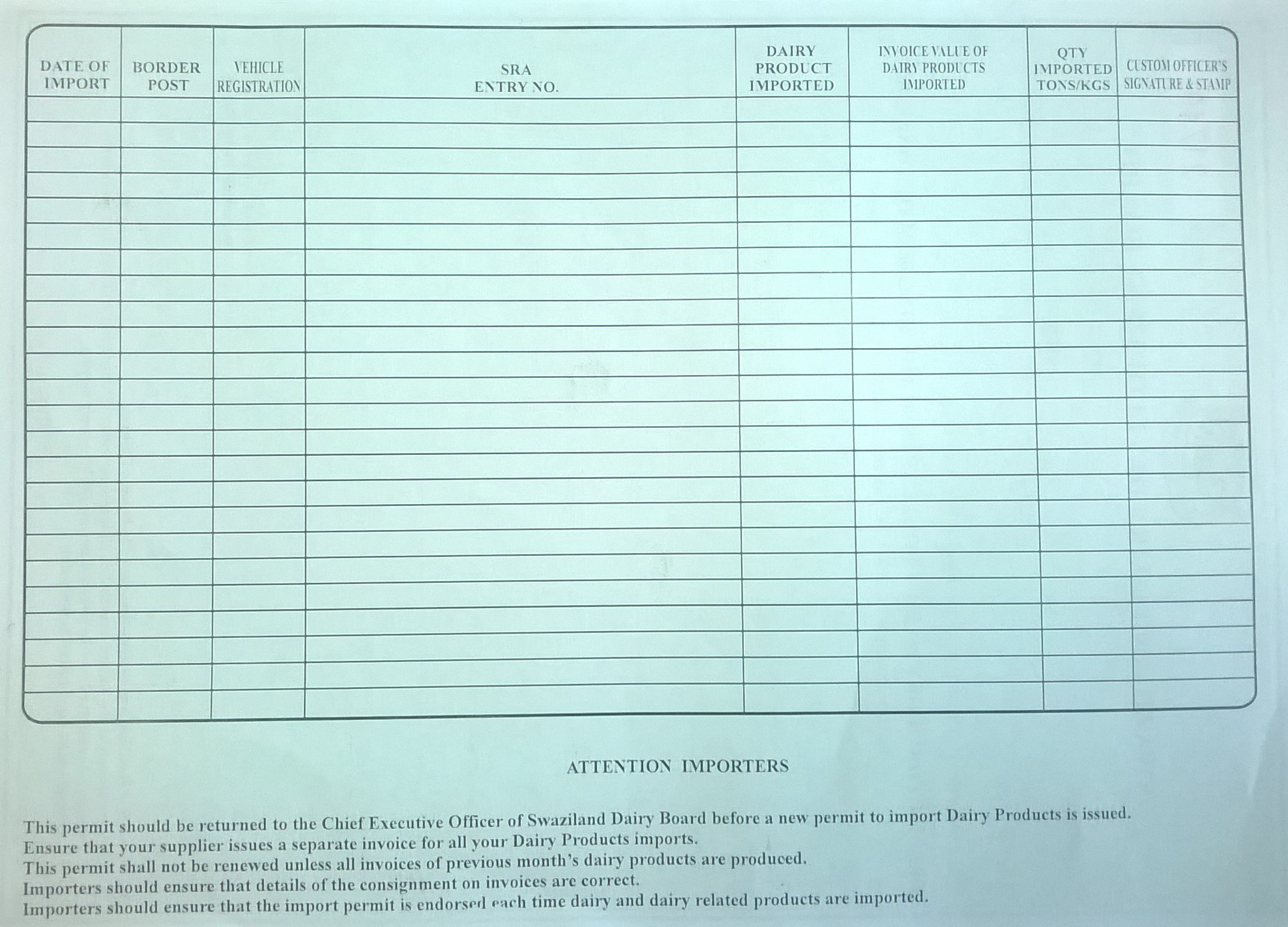
|
| Import Dairy Products |
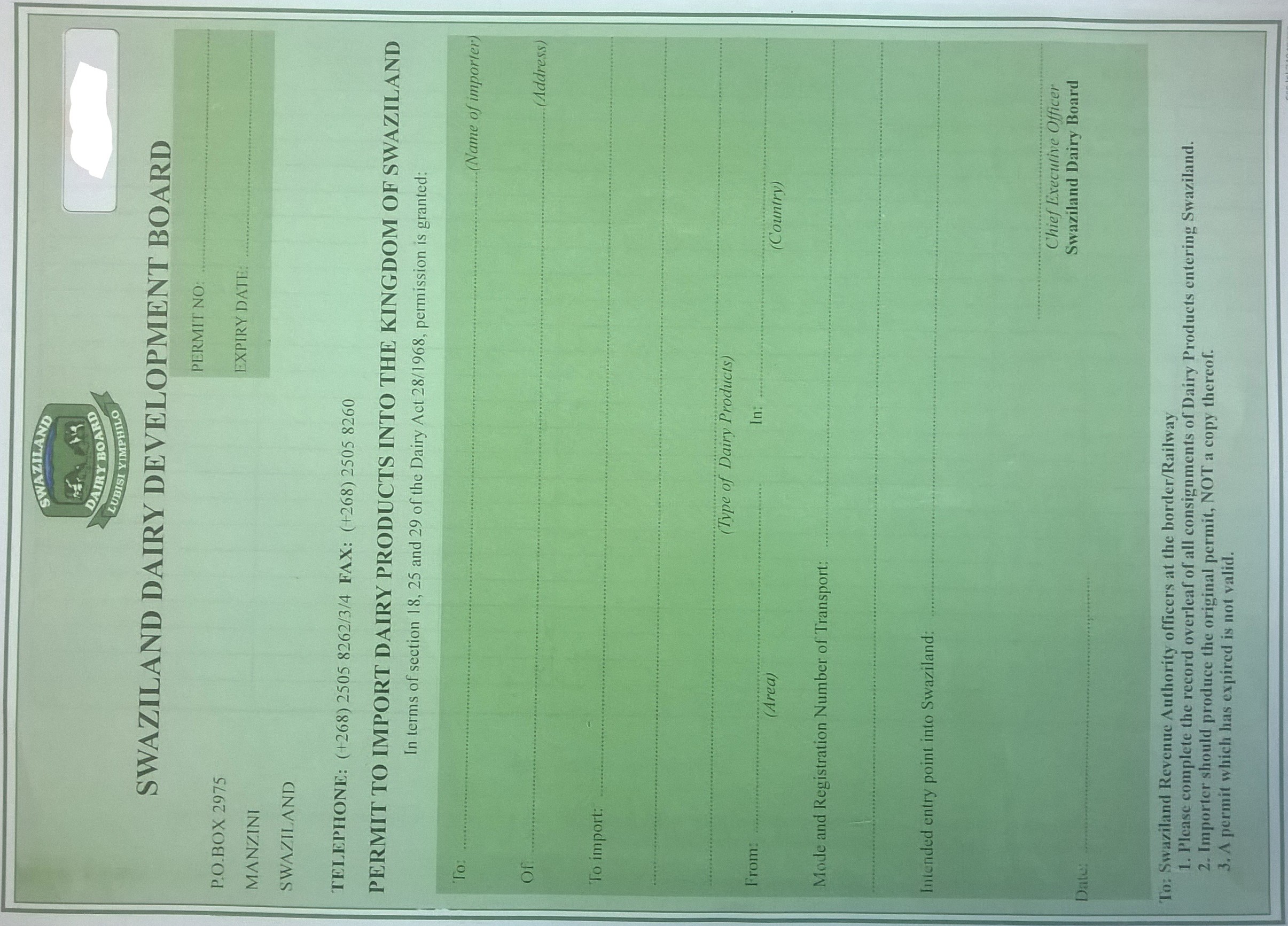
|

|
| Export Dairy Products |
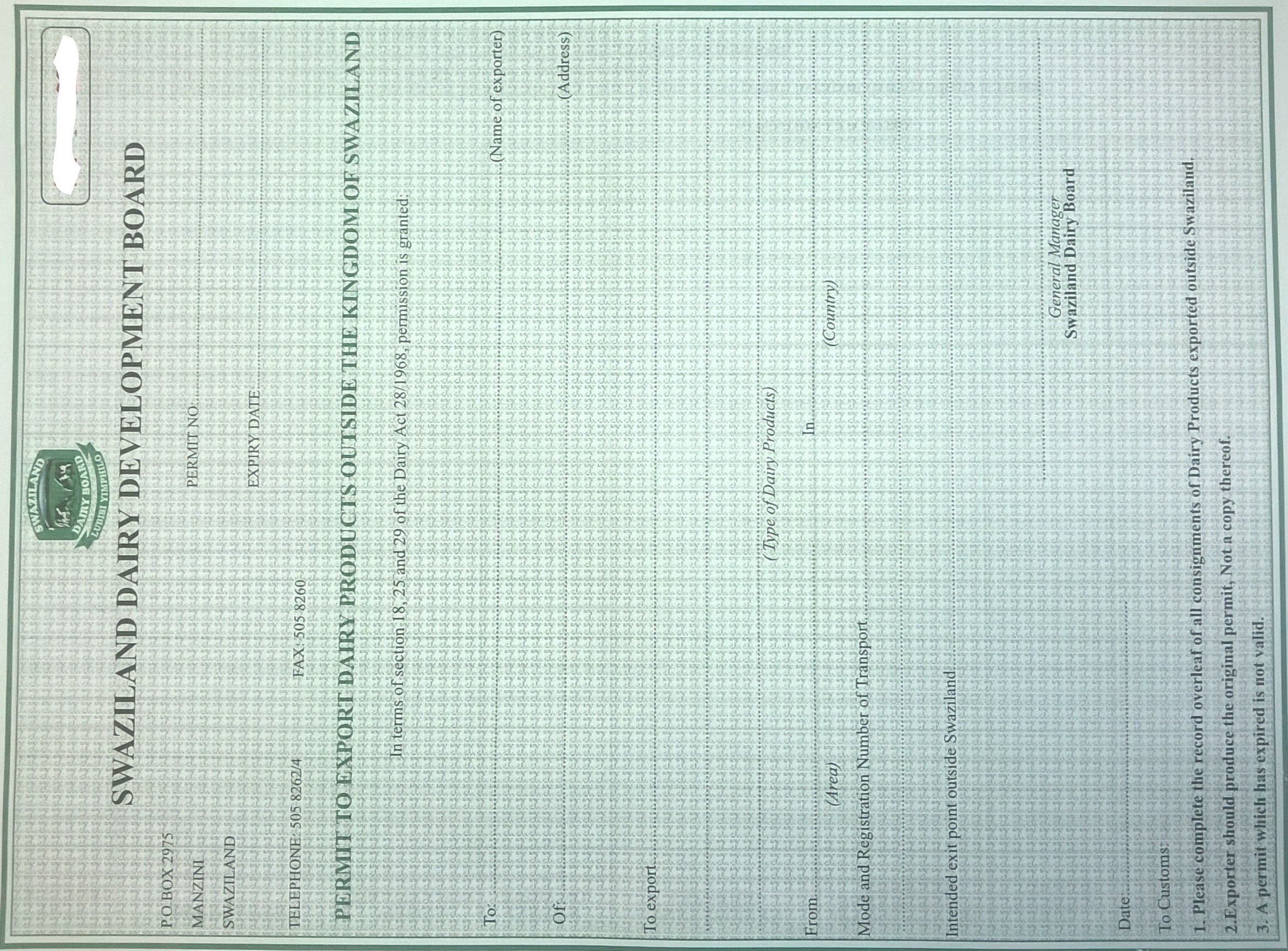
|

|
| Import Honey |
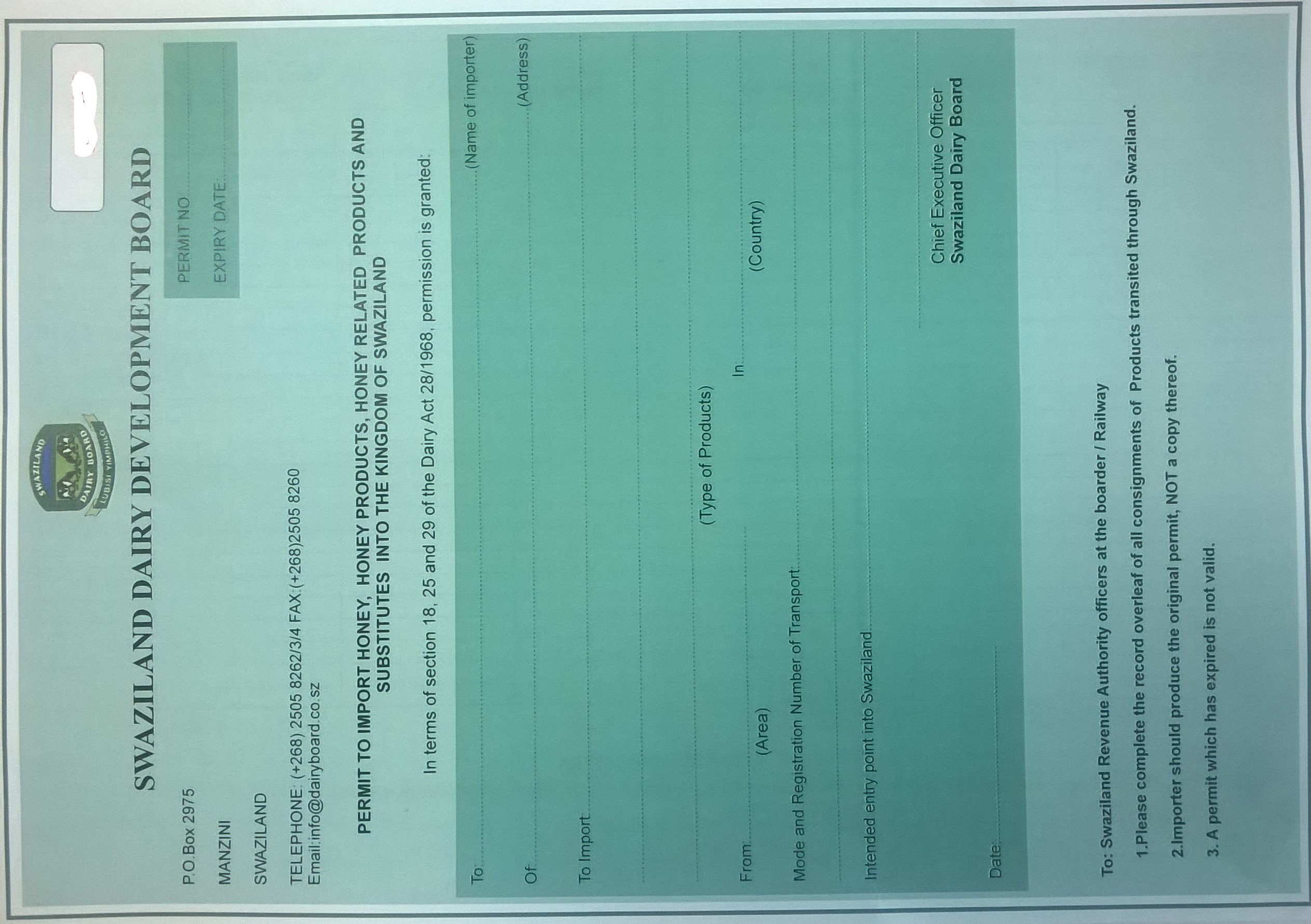
|
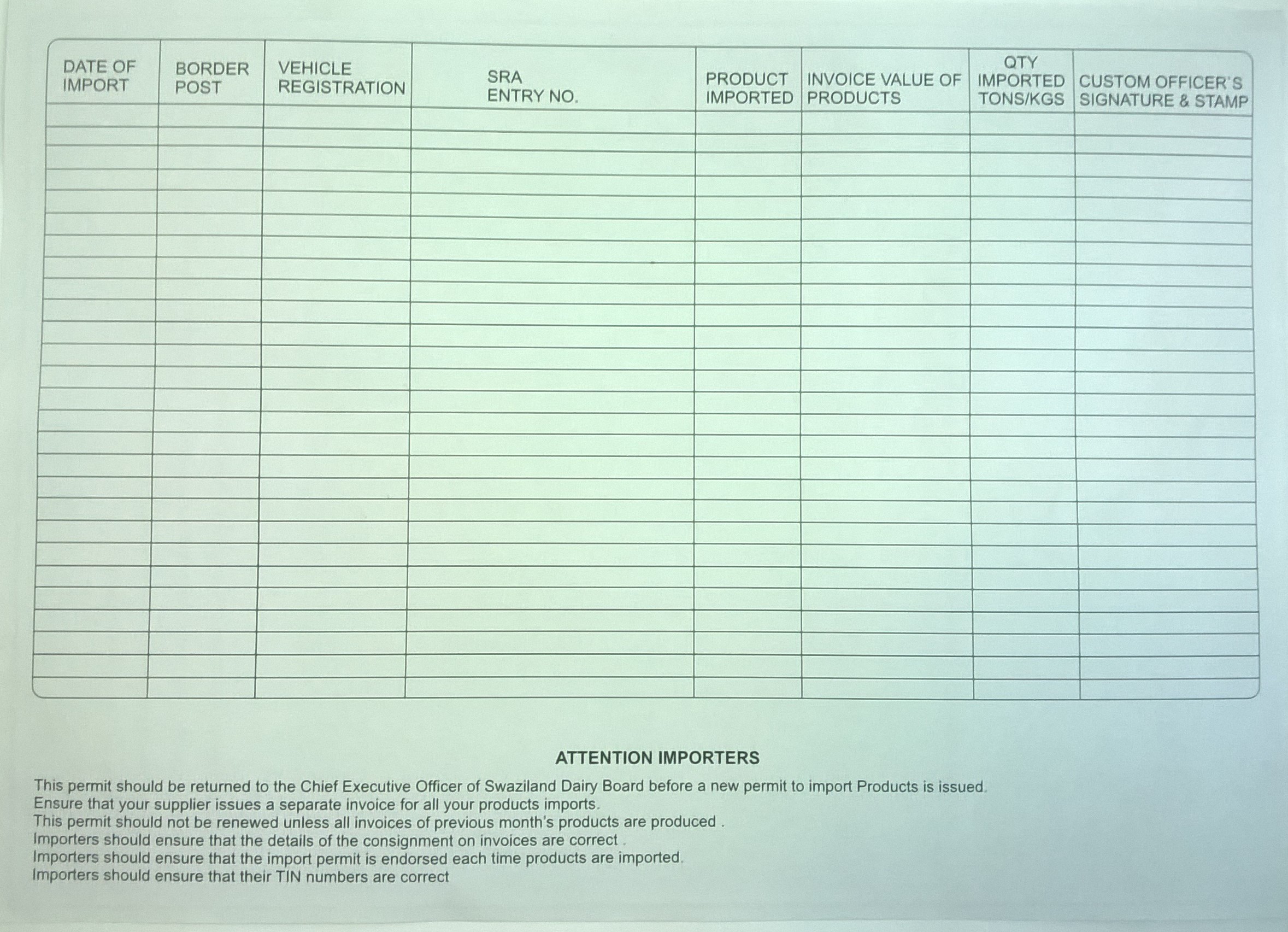
|
| Import Raw/Thermised Milk |
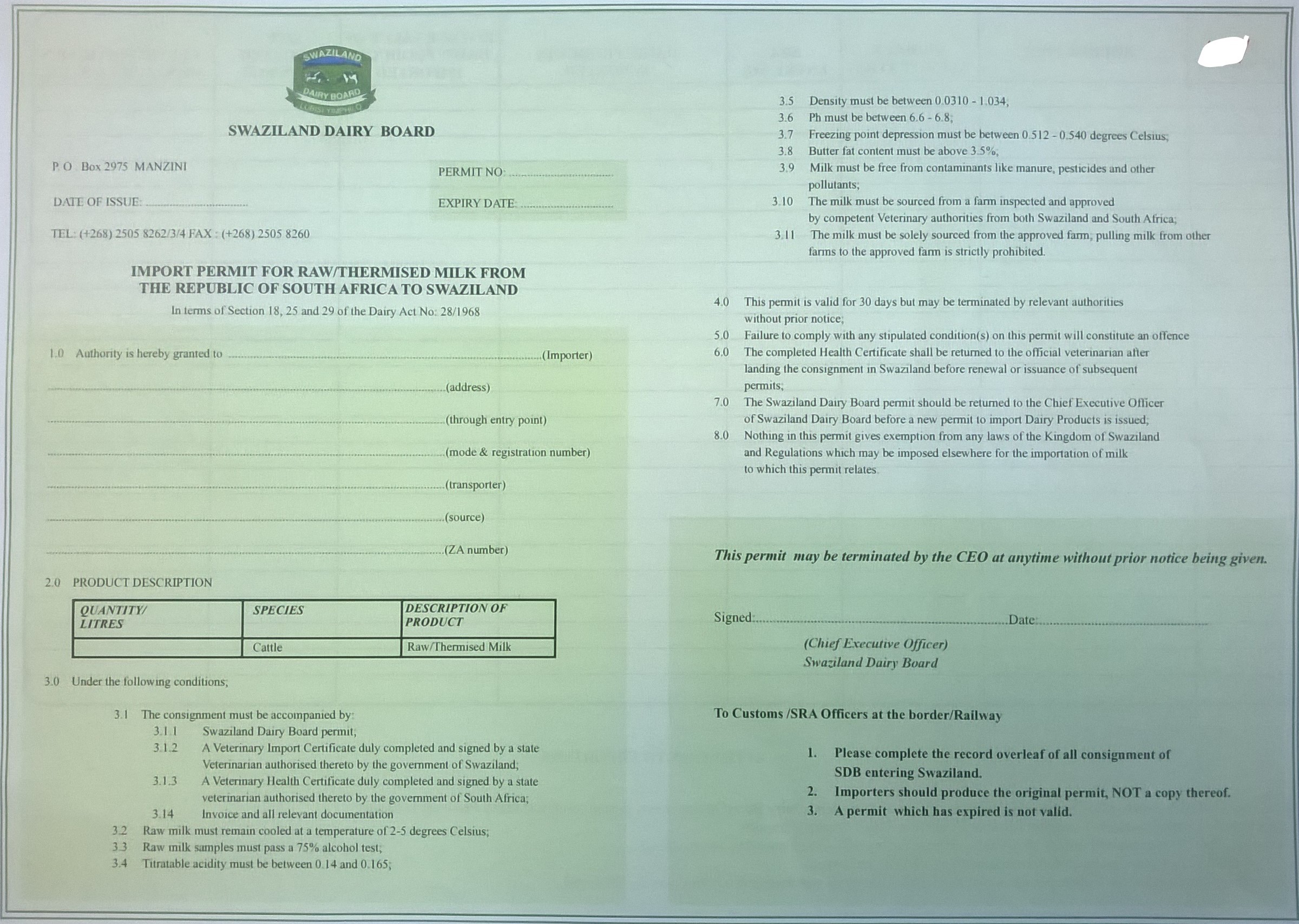 |

|
